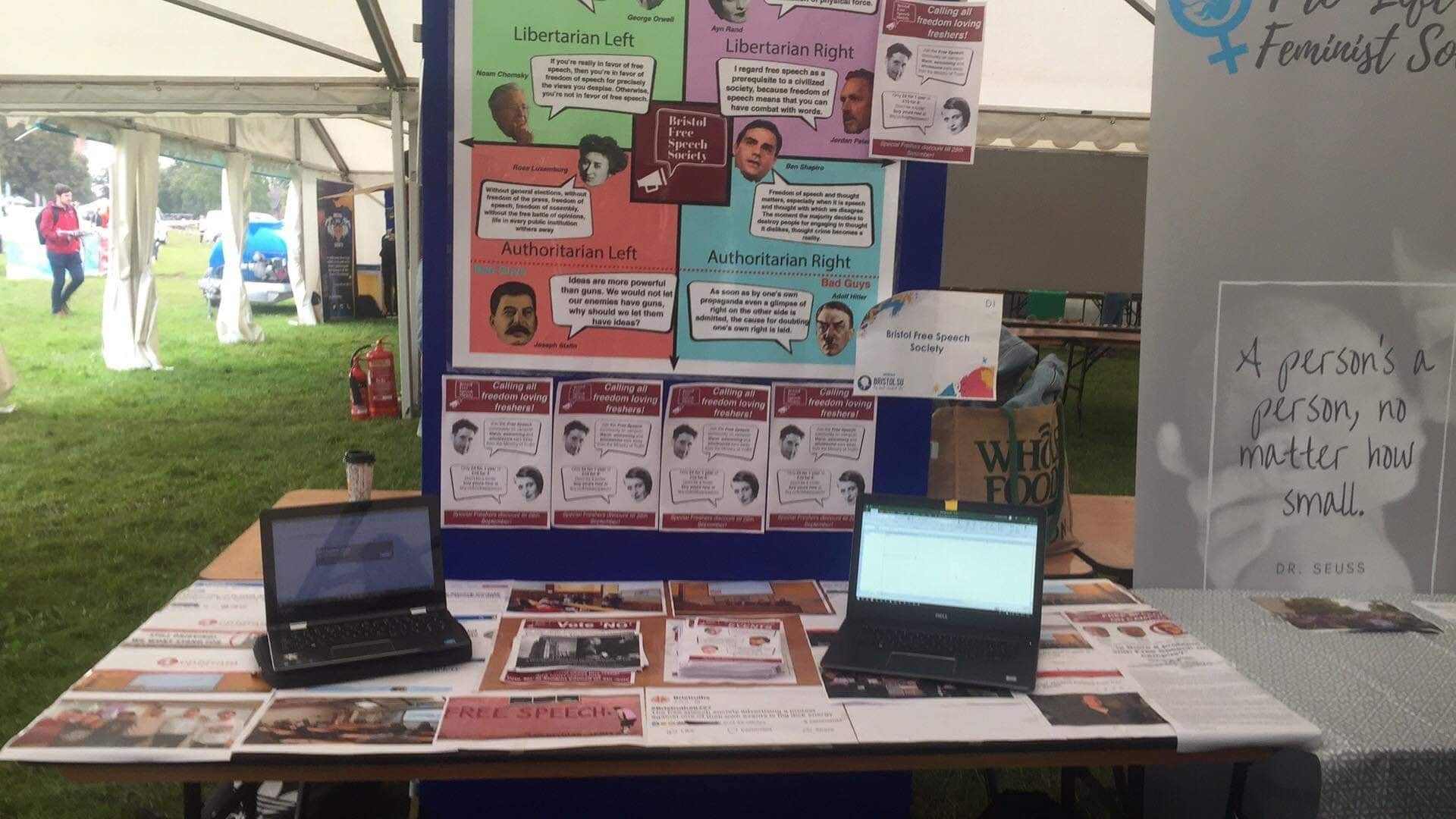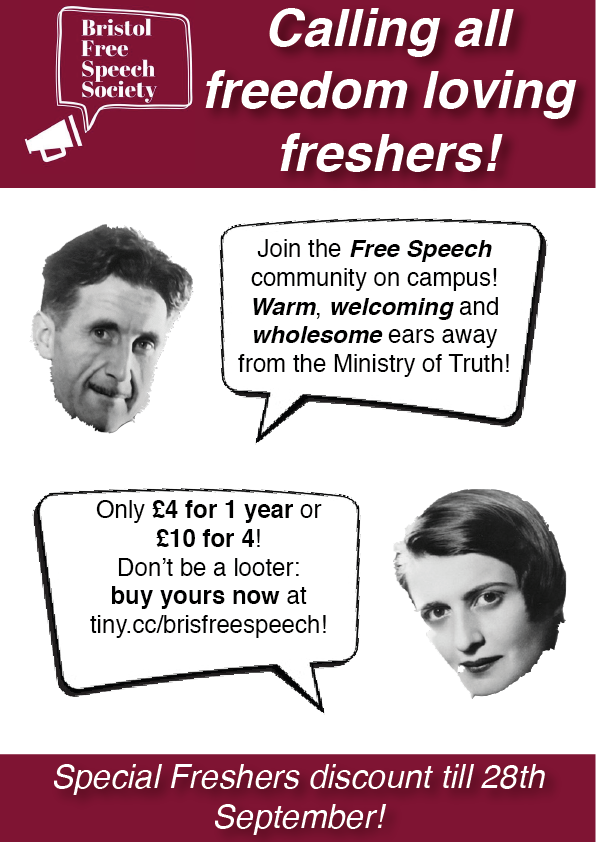By Molly Pipe, Student Life Correspondent
Correction (27 March 2020): In the original online copy of this article published 21 March 2020, the description of Raquel Rosario Sanchez was misrepresentative and has since been redacted. Epigram apologises to Rosario Sanchez for the false description and we have corrected the article accordingly.
Introducing the Bristol Free Speech Society, nominated for Bristol SU's ‘Most Inclusive Society’ Award.
It must be some kind of record. The Bristol Free Speech Society has only been going two years, but in that time it has been deemed Islamophobic and transphobic - and it was shortlisted for the ‘Most Inclusive Society’ Award.
Many on campus will have been surprised at the nomination. Some downright outraged. One critic described the society as ‘a guise for spreading hateful rhetoric’ - and many who don't go that far, still see it as an organised wind-up, aimed at ‘getting a rise out of people’.
In 2018, the society was criticised for hosting Raquel Rosario Sanchez, a feminist researcher who has previously argued that her work is being silenced in academia. In November of that year, they also booked Heather Brunskell-Evans, whose talk on whether transgender children should be allowed to transition was stormed by protesters. A more recent event discussing extremism on campus had to be postponed by five months due to 'security concerns' after hundreds of people signed up to protest it.
| Students protest Free Speech event due to guest speaker
The Bristol Free Speech Society has only been going two years, but in that time it has been deemed Islamophobic and transphobic

Society members themselves describe its reputation as "unfair", and insist that the discussions never go too far.
Society President Izzy Posen, rejects the charge that the group is biased towards the right, and agrees with Campaigns Officer Harry Walker that it is ‘as apolitical as possible’. Izzy estimates that 50% of the group are Labour supporters, and 50% ‘other’. Claims to the contrary, he says, stem from the fact that campus is skewed to the left, ‘so when we want to bring in other voices, it may seem like we’re bringing in specifically right-wing voices.’
Many students are also questioning whether it was acceptable to host Heather Brunskell-Evans’ transgender talk and the answer depends on who you ask.
Society members themselves describe its reputation as "unfair"
According to Izzy, absolutely. Brunskell-Evans, he says, was simply 'raising concerns with some things' when she questioned childhood transition, rather than rejecting transgenderism in full. He would not, he says, book an outright transphobic speaker, and notes that a known transphobe was removed from the society's Facebook group on the grounds that she was ‘toxic’ and made ‘personal attacks on people.’ The society has, he adds, also held an event hosted by a trans woman.
When I question him on the decision to host the event on the same date as a vigil for murdered transgender people, he says that the society had arranged its event ‘long before’ the vigil was announced, and was not aware of the clash until the day before.
Two weeks ago in the Guardian, you said the free-speech problem on campus was a "myth". Now you admit it has been going on for decades. https://t.co/GUdX2i8JYZ
— Fraser Myers (@FraserMyers) March 6, 2020
But Harry, who sports the pink ‘trans alley’ badge, criticises the event for being ‘radical [and] transphobic’. He said he joined the committee after the talk was staged, and ‘would not advocate for it again’.
A transgender woman within the society, however, describes the talks as ‘beneficial’. She says that the protests create a misperception of what such events are actually like. ‘From the outside, you would have thought that everyone [going inside] was transphobic. But what those perspectives missed - and they would have noticed if they actually went to the event - is that the speakers at those events got challenged very heavily.’
Izzy estimates that 50% of the group are Labour supporters, and 50% ‘other’
By all accounts, Izzy advocates a purer form of free speech than his fellow committee members. He puts this down to “growing up in a very restricted, very extremist community, isolated from the rest of society.” He tried to challenge its ideology, but “there wasn’t the space to question it.’
The experience has left him wary of ‘narrow-mindedness and dogmatism’. Open discussion, he says, is a ‘method of self-checking’ designed to ‘get closer to the truth’, and is crucial to make sure that we don’t ‘stay with the wrong views’.
| 'Extremely worrying and distressing' anonymous posts in Free Speech Society's discussion group
Izzy doesn’t himself have a problem with events being protested - he thinks protest is itself an act of free speech - but wishes that the protestors would come into the event to hear what is being said. But, as you can imagine, persuading people who are deeply opposed to a topic to hear more about it is no easy task.
After the extremism event, one activist told Epigram, that she didn’t go into the event when invited because she didn’t want to ‘give space to those kinds of ideas’. Izzy’s belief is that by coming inside she could have given the views a fair hearing, and then had the chance to challenge them in the Q+As.

However, is it unbalanced that so many of these events only have one speaker, showing only one side of the argument? Sure, they all have sections where the audience can ask questions, but that doesn’t have the same intellectual clout as having an opposing expert in the room - someone who really knows the right questions to ask and who is able to point it out if the first speaker’s argument is flawed.
Izzy doesn’t himself have a problem with events being protested - he thinks protest is itself an act of free speech
Harry, commented saying panels at the talks would have been preferable, particularly for the Sanchez event, but the practicalities aren’t always that easy. He added, that this is particularly the case with ‘convincing them [transgender speakers] to come onstage and debate as they are a group more at risk of verbal (and physical) attack.’
But, he says, the society is keen to do more to address ‘concerns’ over free speech, particularly from marginalised students. Last Friday it ran a stall on Tyndall Avenue for students to raise their thoughts directly with the committee, another of which is scheduled for 21st February. There has also just been a discussion with the Student’s Union on how the university should approach the controversial debate.
Harry said he sees these moves as an important part of ensuring that voices aren’t lost. ‘I don’t think that our society should escape criticism,’ he says. ‘Here’s an opportunity to have that dialogue.’
Featured: Courtesy of Bristol Free Speech Society
Have you been to a Bristol Free Speech Society Event? Tell us your thoughts!









